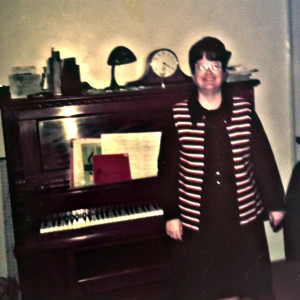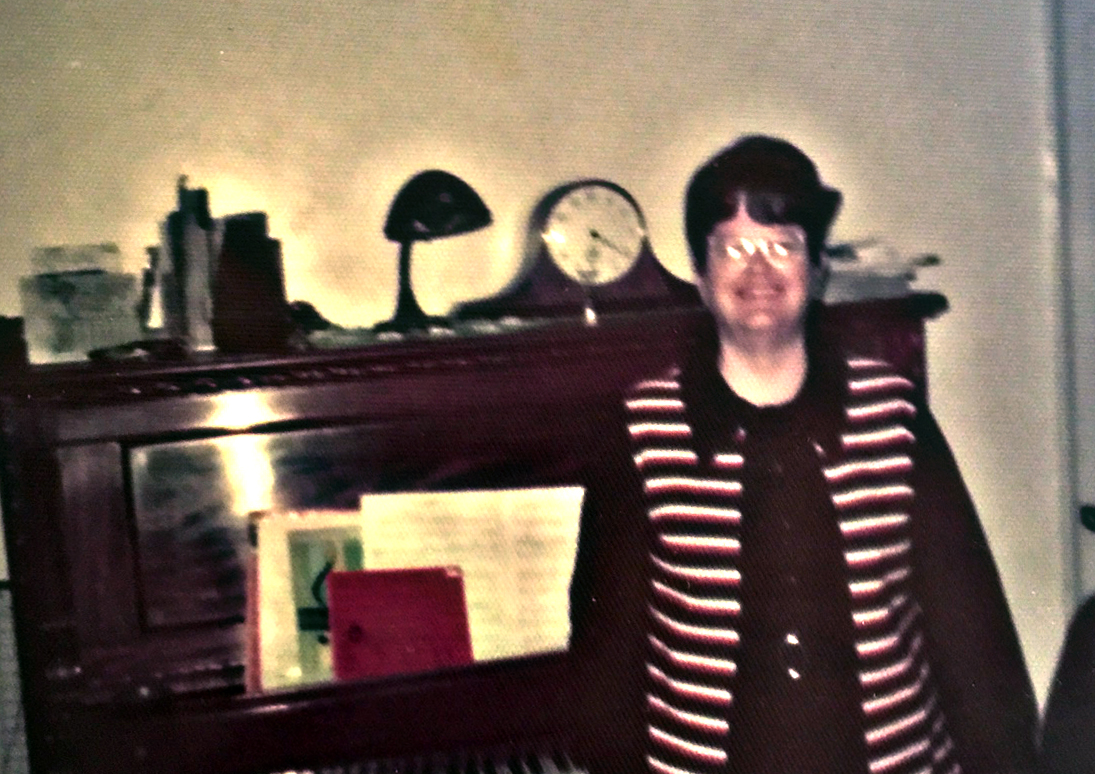
My mother, Elnora Jean Marshall Willhite, found much solace in playing piano during the most difficult years of her life. I often refer to her as a reluctant chanteuse, for as much as she enjoyed singing, she never felt confident enough to use her talents outside church and family.
Earlier this morning I caught the whisper of a song my mother used to play and sing on the piano. She had a voice to rival the divas of her time (and ours), but shared it only in private “concerts” for family and friends. Whenever people came to visit us, or we visited family members with a piano, she would be asked to play and sing. All of us children were told to sit quietly or play outside or in another room.
Some of my fondest memories of childhood are of my mother sitting at her piano—the antique one my father bought for $25 from a man down the street and rolled it around the culdesac to our house. In my early years she specialized in pop and Broadway standards, like “Fly Me to the Moon,” “Sentimental Journey,” “Unchained Melody,” and “Yellow Bird.” I remember my father requesting her to “play ‘Misty’ for me” before Clint Eastwood made the movie of that same phrase.
Most arresting about the song that rustled through my memory this morning is that I haven’t heard it in probably—now I’m dating myself—fifty years. My parents were divorced when I was seven and my mother stopped playing many of the love songs that my father most enjoyed. I googled the title and discovered it was written by Lionel Bart for the musical Oliver! When I read the lyrics I discovered why my mother never played that song again. If ever an anthem has been written for the self-less, insecure, long-suffering [read: abused, emotionally or physically] woman (or man, just change the gender) this is it.
As Long As He Needs Me
| As long as he needs me… Oh, yes, he does need me… In spite of what you see… …I’m sure that he needs me. Who else would love him still I miss him so much when he is gone, He doesn’t say the things he should. |
I know where I must be. I’ll cling on steadfastly… As long as he needs me. As long as he needs me… As long as life is long… If you are lonely I won’t betray his trust… I’ve got to stay true, just ~Lionel Bart |
My mother’s piano and singing influenced parts of my yet-unpublished novel, The Sword Swallower’s Daughter. The novel is not a memoir, and the main character Sheila is not a thinly veiled model of myself. I admit, though, to drawing from childhood memories of my mother and father’s marriage, particularly the nostalgic enchantment of my father sitting in his chair, smoking and listening to my mother play and sing for him.
Here’s an excerpt from The Sword Swallower’s Daughter where I’ve tapped into the memory of my mother playing for my father. I hope you enjoy.
Daddy’s motorcycle in our driveway on Valentine’s Day could mean only one thing; he was here without his girlfriend, Marnie. I rushed inside and wrapped him in a hug. He handed me a red heart-shaped box with a picture of a girl whose eyes winked and her mouth kissed when you turned the box this way and that.
Mama brought Daddy a cup of coffee. Daddy blew across the top of the cup and then sipped up the cooled surface. “Perfect. You always knew how much sugar I needed.” He looked up at Mama with his flirting eyes and winked.
“Least I could do your coffee right,” was all Mama said back.
“You did a lot of things right, Edie. Damn, I miss your cooking.”
Mama almost smiled. Everyone said she was a great cook and a fantastic singer, but the only thing I think she believed was the cooking part.
“We’re having meatloaf tonight,” said Candy. “I helped Mama smush it together.” Candy held up her hands and wiggled her fingers. She turned to Daddy and asked what I wanted to ask, but feared the answer. “Can you stay for dinner? It’s Valentine’s Day.”
I glanced at Mama and sure enough, a red flush crept up her neck like it always did when she got flustered.
Daddy glanced at Mama. “Sorry, Candycane, can’t do that. But I sure would like to hear your Mama play and sing something.”
“Cum’on, Mama, it’s Valentine’s Day.” Candy jumped off his lap and opened the piano cover. “Play ‘Yellow Bird.’”
Mama dug into the piano bench where she kept her sheet music, and pulled out a folio. Candy sat on the bench next to her; Daddy relaxed on the sofa and lit another cigarette. I snuggled next to him, inhaling the mélange of scents that was Daddy in those days. Old Spice, Camel smoke, and Brylcreem lingered as incense to a god, forever sacred in my memory.
“Yellow bird, up high in banana tree. Yellow bird, you sit all alone like me. Did your ladyfriend leave the nest again…”
Mama sang. Daddy drew in the cigarette and fixed his eyes on Mama with the exhale, the smoke lifting and twisting and reaching toward her like I wanted him to do with his arms. The smoke faded into blue before it reached her, as the deepest part of me knew he’d never reach out for her again. Mama’s voice lifted the notes of the song with such sadness, like she was the yellow bird and someone was singing to her. Then I wondered if maybe Daddy had come here on Valentine’s Day because his ladyfriend left him and this was the only nest he’d known. I broke the spell when I asked him.
“So where’s Marnie on Valentine’s Day?”
Daddy looked at his watch. “Waiting for me.”
Mama finished her song, lifted her hands from the piano with the grace of a diva, and turned to him. “Now, don’t keep Marnie waiting.”

